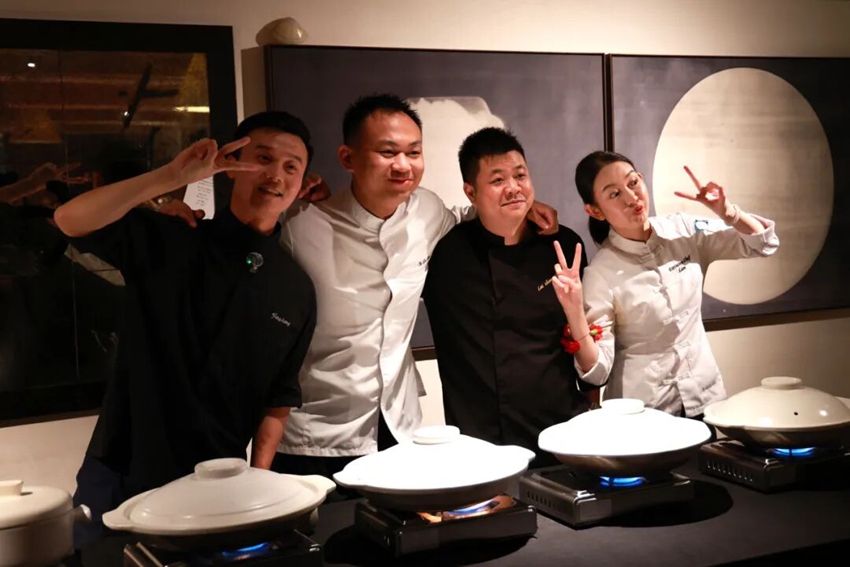- Updates
- News
On the evening of September 21, the air along West Street, just beside Quanzhou's ancient Clock Tower, was filled with the fragrance of sizzling food and the hum of cheerful chatter. Beneath the glow of old arcades, four celebrity chefs from the hit culinary reality show "One Meal to Stardom" (Yifan Fengshen) joined hands for a lively open-air night market debut—a feast cooked and sold on the spot, with all proceeds donated to the Quanzhou Historic City Cultural Heritage Fund.

"One Meal to Stardom" celebrity chefs pose for a photo on West Street — from left: Yang Kang, Ye Linhui, Lai Zhouwei, and Wu Menglin.
Even as midnight approached, queues still curled down the narrow street. Locals and travellers alike lingered under the lantern light, reluctant to leave. The sizzling of woks, clinking of spatulas, and bursts of laughter turned the thousand-year-old street into a living theatre of taste and togetherness—an echo of Quanzhou's old seafaring spirit meeting the energy of a new culinary generation.
When Street Kitchens Meet Heritage Streets
As dusk fell, the crowd began to swell. "Look! That's the chef from TV!" someone shouted. Within moments, people gathered around the line of food trucks, eager to catch a glimpse—and a taste.
Ye Linhui, a young chef from Xiamen's Burning Theme Restaurant, mixed his signature hand-shaken mojitos with showman's flair.
Yang Kang, Executive Chef of KAIPUU BELFRY Hám-Khàk restaurant and the event's lead organiser, prepared his famous saltwater duck, a nostalgic flavour from his hometown.
Wu Menglin, the Hong Kong–born "Mulan of the Kitchen," surprised diners with a bold and spicy yellow pepper pork intestine dish, instantly winning over adventurous palates.
From Shenzhen, Lai Zhouwei of Xu Ji Seafood served up pickled vegetable pork knuckle, a street-style comfort food reimagined for the night market.
"This is my first time cooking on the street—it's electric!" laughed Ye Linhui as he passed another mojito to someone waiting in line. "The people of Quanzhou have this warmth that's contagious."
Yang Kang agreed, adding, "The fire, the aroma, the crowd—this kind of energy brings food to life. Cooking here feels like giving something back to this inclusive city that has welcomed so many."
A Taste of Connection
"Freshness," said Wu Menglin, "is not a single flavour—it's the meeting of good ingredients and the right hands." Inspired by Quanzhou's diversity, she found herself captivated by its unique mix of local and Southeast Asian flavours—beef steaks grilled with tropical marinades, and tusun dong, a local delicacy blending multiple flavour traditions. "This city's taste," she smiled, "is never closed—it's open, layered, and alive."
For Ye Linhui, street cooking itself carries meaning: "The street is the most democratic dining table—just like Quanzhou's culture, it never stands on ceremony."
Meanwhile, Lai Zhouwei underscored the event's deeper purpose. "Everything we made tonight was cooked fresh and sold for charity—the income fully donated. Good food can also do good. It connects people in a different kind of warmth."
Where Flavours Become Stories
As the night deepened, the fires in the food stalls dimmed, but the aroma lingered over West Street like a gentle memory. Locals and visitors waited side by side, sharing laughter, flavours, and a cool night breeze.
This was more than a pop-up night market. It was a conversation between tradition and innovation, between heritage and modern creativity. From fine dining to street-side grilling, from local comfort food to boundary-crossing cuisine, Quanzhou—a UNESCO World Heritage city—continues to open its arms through taste.
Here, in the flicker of lamps and the laughter of the crowd, food becomes more than sustenance—it becomes a story.
And perhaps, that lingering scent in the night air will be the reason travellers remember Quanzhou—
not only as a city of heritage,
but as a city that tastes like home.
